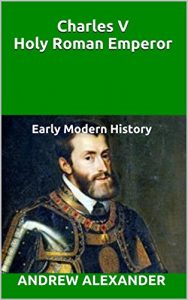Charles V was the dominant European monarch during the first half of the sixteenth century. Through a series of births, deaths and marriages, he acquired a personal empire that encompassed the Burgundian Netherlands, Austria, Castile, Aragon and parts of Italy.
In 1519, he was also elected Holy Roman Emperor.
His territories and resources were vast, but so were his problems.
He is often described as the last medieval emperor and he struggled dutifully from his mid-teenage years until his abdication in 1556 to perform his duties. It often seems as though the rest of Europe opposed him; the French, the Pope, the German Protestants, the Turks; sometimes even his own subjects.
This 9,400-word study aims to provide the reader with an understanding of Charles and his reign, both as a study in its own right, and as a stepping-stone to further research.
The main areas covered are:-
• Charles’ Personality
• Charles' Empire
• The Imperial Election - 1519
• Charles' Major Problems
• The Hapsburg-Valois Wars.
• Charles as Charles I of ‘Spain’
• Charles’ Problems with Regionalism
• Charles and the German Princes and Protestants
• Charles and the Turks
• Charles as Ruler of the Netherlands
• Charles’ Abdication
• Conclusion – Was Charles V a Success or a Failure?
Early Modern Age Series by Andrew Alexander:
Europe in 1500.
Ferdinand of Aragon and Isabella of Castile
Charles V – Holy Roman Emperor.
The Protestant Reformation.
Philip II – King of Spain.
Henry IV – King of France.
Cardinal Mazarin – Chief Minister of France.
Cardinal Richelieu’s Foreign Policy.
Louis XIV – King of France.
The Decline of Spain in the Seventeenth Century.
Peter the Great – Tsar of Russia.
In 1519, he was also elected Holy Roman Emperor.
His territories and resources were vast, but so were his problems.
He is often described as the last medieval emperor and he struggled dutifully from his mid-teenage years until his abdication in 1556 to perform his duties. It often seems as though the rest of Europe opposed him; the French, the Pope, the German Protestants, the Turks; sometimes even his own subjects.
This 9,400-word study aims to provide the reader with an understanding of Charles and his reign, both as a study in its own right, and as a stepping-stone to further research.
The main areas covered are:-
• Charles’ Personality
• Charles' Empire
• The Imperial Election - 1519
• Charles' Major Problems
• The Hapsburg-Valois Wars.
• Charles as Charles I of ‘Spain’
• Charles’ Problems with Regionalism
• Charles and the German Princes and Protestants
• Charles and the Turks
• Charles as Ruler of the Netherlands
• Charles’ Abdication
• Conclusion – Was Charles V a Success or a Failure?
Early Modern Age Series by Andrew Alexander:
Europe in 1500.
Ferdinand of Aragon and Isabella of Castile
Charles V – Holy Roman Emperor.
The Protestant Reformation.
Philip II – King of Spain.
Henry IV – King of France.
Cardinal Mazarin – Chief Minister of France.
Cardinal Richelieu’s Foreign Policy.
Louis XIV – King of France.
The Decline of Spain in the Seventeenth Century.
Peter the Great – Tsar of Russia.






